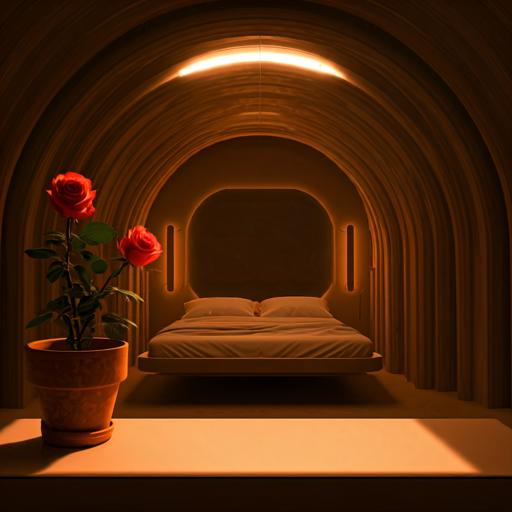She had never seen a real flower. Only in the faded pictures and hazy videos buried in her grandfather's dusty library. He would speak softly of the world as it once was—a place pulsing with color, life, and the comforting sounds of animals that roamed the lands, the skies, the seas. He spoke of people digging their hands into rich soil to grow food, of laughter shared in warm sunlight, and nights filled with starlight. He called it paradise. That paradise, he said, had vanished—erased by wars, plagues, and the relentless march of climate change.
Now, only humans remained, fed by artificial food churned out by machines. The sky hung heavy with smog, rivers ran dark with toxins, and the earth lay desolate. Gone was the beauty, the promise, the hope.
Yet she had a secret, a fragile glimmer of life she kept hidden from the sterile monotony around her. One day, while thumbing through an ancient book, she had found a single seed, a relic of the world she had only heard about. She didn’t know what kind of plant it would become, but she felt its importance. She had planted it in a small, cracked pot, watering it with her own tears, nursing it as though it were the last life on Earth. She kept it close, away from prying eyes and the watchful authorities who would destroy any living remnant of the world before.
Each day, she watched it with awe. A tender green shoot emerged, then grew taller, stretching toward the dim light in her room. Leaves unfurled, then small, delicate buds formed. She found herself holding her breath, waiting, dreaming of what they might become. She imagined color—a vibrancy she had only seen in her dreams—and a scent that might tell her the secrets of a world long gone.
Then, one morning, the buds opened. She gasped. Soft, white petals, tinged with pink, lay before her, each one more beautiful than anything she had ever known. Their scent was delicate and sweet, whispering of life beyond machines, beyond survival. She wept, cradling the pot, overcome by gratitude—for the plant, for her grandfather’s stories, for this small miracle. For the first time, she felt truly alive.
She decided to call it a rose, after the name she had found in one of the old books. This rose was hers alone, a secret sanctuary of beauty. Only her grandfather would understand. She could already picture his weathered face breaking into a rare smile when he saw it.
What she didn’t know was that this rose, this precious bloom, held a secret of its own. Deep within its stem, a microchip lay dormant, hidden from view, carrying a signal. A signal that reached out to satellites that hadn’t moved in years. A signal that awoke a sleeping warhead, a missile armed with a virus engineered in forgotten wars.
Unknowingly, she had lit a fuse, setting in motion the final, irreversible end. As she held her rose close, her secret joy, the skies were already stirring, the silence of the barren world about to be broken one last time!
